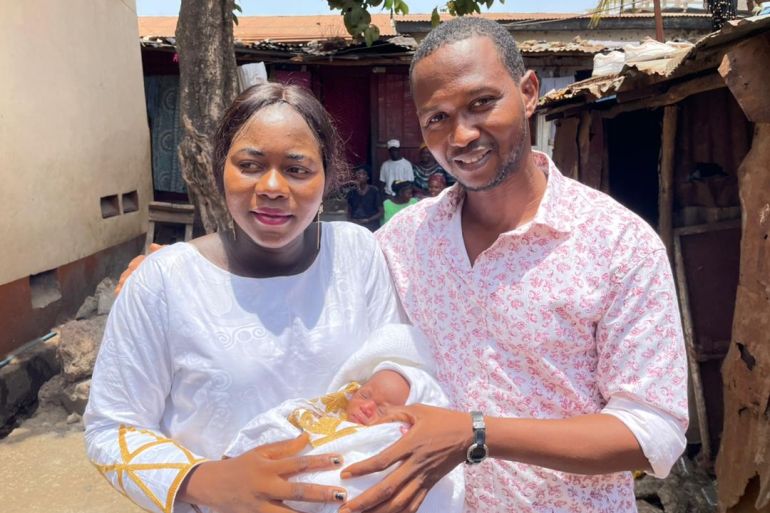The WhatsApp group helping Nigerian women with fertility issues
This Nigerian-founded WhatsApp group is helping women with Polycystic Ovary Syndrome beat stigma and find solutions.

Ibadan, Nigeria – Only a few months after Rukayat Muhammed’s December 2019 wedding, her relatives began asking why she had not had a baby yet. Some snickered surreptitiously that her womb was damaged.
“In Nigeria, two things are involved when you don’t conceive on time,” the 27-year-old plant scientist told Al Jazeera. “People either tag it a spiritual problem or you’re tagged as someone whose womb has been damaged through several backdoor abortions.”
Keep reading
list of 4 itemsFirst pig kidney in a human: Is this the future of transplants?
Why are some countries decriminalising drugs?
‘No good evidence’ for gender care for youth over long-term, review finds
“You have a spirit husband, go outside [for religious help],” her aunt said. Her mother was also pressing her to seek solutions.
The experience haunted Muhammed who had just found out after a test in March 2020, that her inability to conceive was due to a syndrome called Polycystic Ovary Syndrome (PCOS).
According to research conducted by the Department of Public Health, Babcock University, Ilisan-Remo, Polycystic Ovary Syndrome (PCOS) is the most common endocrine disorder in Nigerian women of reproductive age affecting between 5 to 10 percent of them.
It is a disorder that puts women at risk of infertility, diabetes and other diseases, scientists say.
In search of answers
And the numbers are grossly understated, says Olamide Akinyemi, a PCOS expert at Abiye Mom, an online fertility clinic.
“This is because there are a few symptoms of PCOS which vary from menstrual irregularities, abnormal hair growth like beards and hair on the chest, and excess weight and fat,” he said. “Despite these symptoms, PCOS may not cross a doctor’s mind until a patient shows symptoms of infertility… yet PCOS is far more common than we can imagine.”
Although PCOS awareness month is marked worldwide every September, there is still limited awareness in many parts of Africa about this common gynaecological endocrine disorder in women of reproductive age. Currently, it has no known cure and can only be managed with the help of an endocrinologist or a fertility nutritionist.
The ovaries are filled with cysts instead of eggs or normal follicles, hence the name of the condition, explained Akinyemi.
“These cysts don’t grow into the fully mature eggs which happens during ovulation so the woman cannot ovulate (anovulation) or she ovulates once in five or six cycles (oligo-ovulation),” he added. “There’s also the case of menstrual irregularities, the most common is oligomenorrhea, which is when a menstrual cycle length is greater than 35 days but less than six months.”
For Muhammed, the symptoms had been there throughout puberty – she was hairy, had excess weight and irregular menstruation – but she never understood why. But she first heard the term PCOS in March 2018 when her menstrual cycle became more infrequent. Her doctor directed her to a gynaecologist also in Lagos for a test which confirmed she had high testosterone levels.
“The gynaecologist told me it was a symptom of PCOS but didn’t say more and I also didn’t bother about it,” Muhammed told Al Jazeera. “I thought it was just one of those regular syndromes that wouldn’t mean much later.”
But after her March 2020 test, Muhammed went on Facebook in search of answers. There, she joined a women’s reproductive health page and eventually asked a question about PCOS. Someone called Ajoke Fadairo replied and told her about a WhatsApp group of people like them.
“It was just two weeks old and I was one of its first members,” Muhammed said.

‘Now God has blessed us’
Simply called PCOS & TTC (Trying To Conceive), WhatsApp Group was created by Fadairo on 20th April, 2020. It started with four members and now consists of 82 women from different parts of the world; the US, Sierra Leone, Ghana and predominantly, Nigeria.
Fadairo, a 33-year-old pharmacist who resides in Ibadan, Nigeria was diagnosed with PCOS after getting married in 2019.
“Being a pharmacist, I tried so hard to get pregnant but nothing happened,” she said. “I have tasted the pain of trying to conceive and I understand how women feel. Most of these TTC mothers don’t have people that will understand them to share their pains with.”
So she created the group to create a safe space for women suffering from PCOS or similar conditions. The members, two-thirds of which are married women and the rest single women, are predominantly from Nigeria – including one who lives in the United States. Three members are from Sierra Leone and one is from Ghana. Their ages range from 24 to 36 years old.
“I created that group with just four members and now to the glory of God we are more than 80 members,” Fadairo said. “Now God has blessed us with 13 healthy babies from 13 members, six miscarriages and seven more members are currently pregnant.”
“Some medical doctors do not have sound knowledge about PCOS thereby misleading patients,” she added. “The creation of the WhatsApp group is to erase misguidance and manipulation by some medical doctors when it can only be managed by experts.”
Within the group, members share medications, diets and other advice. They also provide emotional support for each other and when necessary, financial assistance to run tests and scans.
One member was ejected with her husband from his family house because she had no baby after two years of marriage. The group raised money for the couple to rent an apartment.
Muhammed now has a six-month-old son and is overjoyed.
“I felt less alone in the world after joining the group,” she said. And now she helps other members in research, using knowledge gleaned from the group and working on infertility and reproduction for her undergraduate thesis.
“Rukayat once sent me flaxseeds, sunflower seeds and a host of others I couldn’t get here myself,” Mariama Angelo, a Freetown-based member and civil servant, told Al Jazeera.
Muhammed, who she met on Facebook, invited her to join the WhatsApp group and later introduced her to her own doctor. In August 2021, she became pregnant and is now the mother of a three-month-old baby. “I’m always grateful that God sent [her] to me,” Angelo told Al Jazeera
“Sometimes I think about how I would have felt had I not found the group when I needed it,” Muhammed said. “A lot of people do not know about PCOS in Nigeria, the inability to conceive on time is always tagged and stereotyped.”